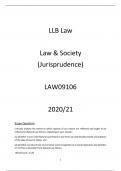LLB Law
Law & Society
(Jurisprudence)
LAW09106
2020/21
Essay Question
Critically analyse the extent to which aspects of our nature are reflected and ought to be
reflected in Natural Law theory, explaining in your answer:
(1) whether in your view Natural Law theory in any form can and should provide a foundation
of the idea of law for today, and
(2) whether our idea of law must involve some recognition of a moral imperative and whether
or not this is derivable from Natural Law theory.
Word Count: 2,135
1
, Introduction
While reviewing the realms of Natural Law theory, a quote from George Orwell’s Animal Farm springs
to mind: “The only good human being is a dead one” 1. A recurring theme in Natural Law theories is
that a higher law or set of values is reflected in our human nature and accessible to human reason. 2
This set of values, moral or otherwise, is mirrored in the law to seek the common and individual good.3
Natural Law theory is frequently stated to be the point of intersection for law and morality 4, yet there
are still challenges to that; most notably from Hobbes’ Social Contract5, Hume’s empiricism6, and the
rise of Legal Positivism7.
This essay will first critically analyse the extent to which the aspects of human nature are reflected
in classical and modern Natural Law theory, and the extent to which human nature nature ought to
be reflected. Thereafter, this essay will argue that our idea of law should overlap with morality and
that Natural Law theory should provide the foundation of law today.
Natural Law and Human Nature
It would be unnatural to discuss Natural Law theory without mentioning the ideas of the Greek
philosophers Plato and Aristotle. Indeed, Plato is argued to be the founder of Natural Law theory.8 For
Plato, “the fundamental of ethics lay in absolute values that could emulate.” 9 The example associated
with this theory is that a beautiful object derives its beauty not from itself but from elements of beauty
discovered within the object itself.10 We know “intuitively” what beauty is, although the precise
interpretation may be improved by the “application of reason”. 11 Plato believed that God was the
“measure of all things”12, not men or their will.13 Indeed ‘nature’ for Plato meant ‘real or empirical
reality’, thus natural law would be real law as opposed to the law understood by humans.14 The nature
1
George Orwell, Animal Farm (Penguin UK 2003) ch.4. Although the premise of Orwell’s novel is an ironic take
on the Soviet Union, one cannot evade the humorous irony when applied to Natural Law.
2
John Finnis, Australian Philosopher, 1940-. See John Finnis, Natural Law and Natural Rights (2nd edn, OUP
1980) para.23-5.
3
Brian H. Bix, ‘Natural Law: The Modern Tradition’ in Jules L. Coleman and Scott Shapiro (ed) The Oxford
Handbook of Jurisprudence and Philosophy of Law (OUP 2002) 65
4
A Passerin D’Entrèves, Natural Law (London: Hutchinson, 1970) 116.
5
See Thomas Hobbes, Leviathan (first published 1651, Penguin 1985)
6
See David Hume, A Treatise of Human Nature (L.A Selby-Bigge ed, 3rd edn Clarendon Press 1978)
7
Raymond Wacks, Understanding Jurisprudence: An Introduction to Legal Theory (6th edn, OUP 2021) 20
8
John Wild, Plato's Modern Enemies and the Theory of Natural Law (The University of Chicago Press, 1953) 134
9
Raymond Wacks, Understanding Jurisprudence: An Introduction to Legal Theory (6th edn, OUP 2021) 22
10
Ibid.
11
Ibid.
12
Plato, The Laws (T.J. Saunders trans., 1970) at bk. IV, § 6. 175.
13
Donald R. McConnell, 'The Nature in Natural Law' (2008) 2 Liberty U L Rev 797, 806
14
Hans Kelsen, 'Plato and the Doctrine of Natural Law' (1960) 14 Vand L Rev 24
2




